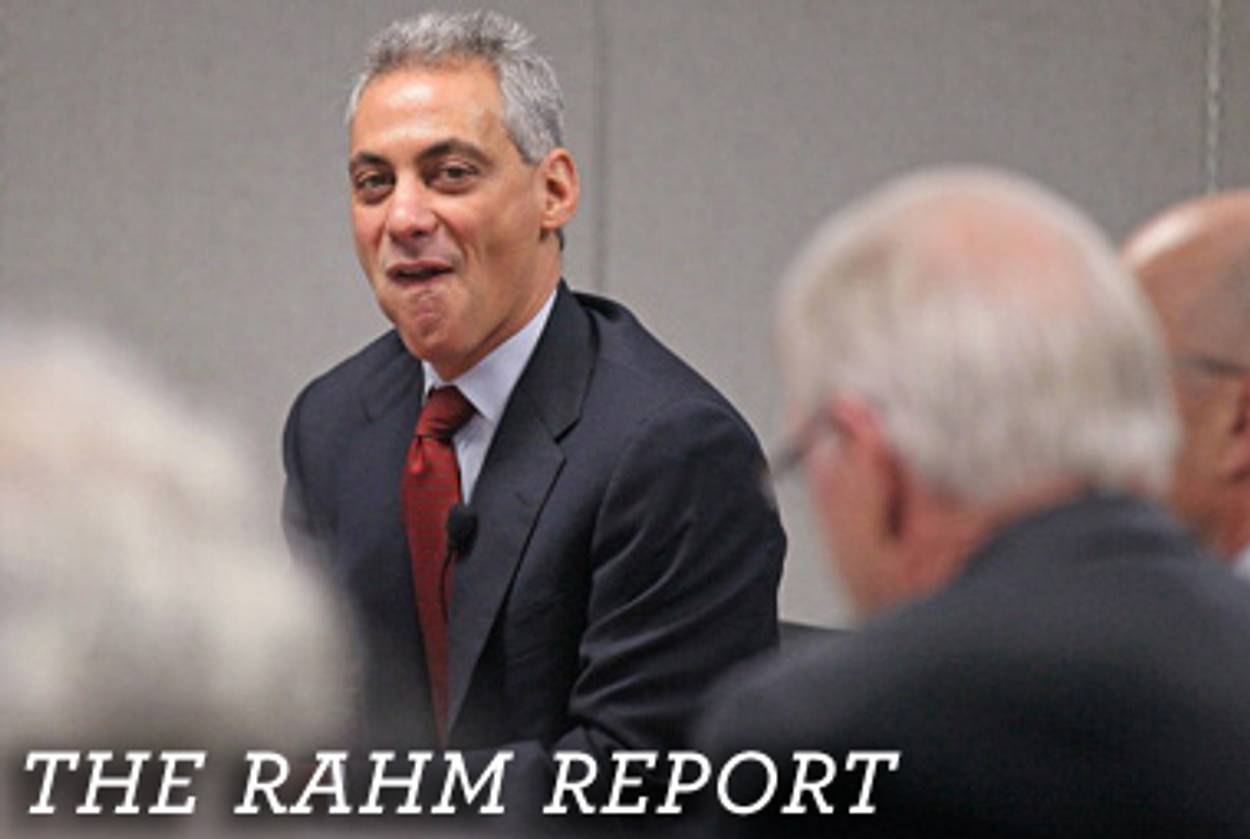Live From the Rahm Residency Hearing
How Goliath became David (for a day)




CHICAGO — During the 11-plus-hour hearing yesterday to establish Rahm Emanuel’s residency in the city of Chicago—an old state law requires that Illinois candidates must have lived here for one year prior to campaigning—the former White House chief-of-staff sat humbly at a desk in the crowded, badly lit basement of 69 West Washington Street. Wearing a subdued tie and a modest blue jacket, he appeared more bookish functionary than “Rahmbo.”
More than two dozen objectors, each of whom had the opportunity to ask Emanuel questions, were crammed in the front of the room and cordoned off. The media sat behind them and along the sides of the room. Gawkers, believers in democracy, and other observers sat in the gray chairs in the audience. The Board of Elections Commissioners, presided over by the saintly Joseph Morris, sat at the front of the room facing outwards.
Occasionally, Emanuel made a quiet joke. A couple times, he made a sarcastic remark in a soft voice. He never got angry, even as the day stretched into the evening and the questions got weird.
“Are you the butcher of Waco? asked Jeffrey Joseph Black, whom Joseph Morris had already reprimanded.
“Are you a member of the Communist Party?” inquired Paul McKinley, who wore a t-shirt with a picture of the Robert Taylor Homes and the words, “Where I’m from” on it.
One objector began her interrogation by asking, “Your name is Rahm ISRAEL Emanuel, is it not?”
Mid-morning, a woman was quickly ushered out of the room for booing the proceedings.
Although he did object to many of the objectors’ questions, Joseph Morris instructed Emanuel to answer several others, including one about whether he was an Israeli citizen. (He isn’t, and he said as much.)
Throughout the day, Emanuel repeated the same facts over and over again: After President Obama asked him to come to Washington, D.C., and run his White House, he leased his house at 4228 North Hermitage to Robert Halpin, of late himself a mayoral candidate. He continued to pay property taxes and hold an Illinois driver’s license. He is currently renting an apartment at 724 North Milwaukee Avenue, because after he decided in October that he would like to return to Chicago to campaign for mayor, Halpin had declined to turn over the lease on the Hermitage building in the fall, even after being offered additional compensation.
With all that money you were making in Washington, one objector wanted to know, why did you rent out your house in the first place?
“It was for the safety and security of the house on the advice of real estate professionals,” Emanuel replied.
“That don’t make sense,” someone whispered behind me.
There were technical issues throughout the day. At times, Emanuel spoke so quietly that it was difficult to hear him. When the microphone malfunctioned, he quipped, “This hasn’t happened since my bar mitzvah.”
Burt Odelson, the lead attorney for the objectors, who, I was told, refused to use a microphone, could barely be heard. He asked Emanuel where he had gone to grade school.
Later, he showed photos of each room in the Hermitage house, questioning Emanuel closely about each one. Emanuel delivered a long, passionate monologue about “his most prized possessions,” which he had left in the basement, including a bed, piano, televisions, family stereo, “our most valuable possessions, Amy’s wedding dress, the family china, family photo albums, clothes, set of boxes, paintings, the clothes that the children came home from the hospital in, and a coat, a jacket worn by my grandfather and given to my father … the first coat for a Chicago winter.”
Emanuel returned several times to his family’s story of coming to Chicago: His grandfather in 1917, his father in 1959.
Later in the afternoon, as the hearing got progressively more outlandish, one of the objectors, Queen Sister Deloney, asked why, if Emanuel’s “granddad’s Technicolor dreamcoat” was so important to him, he left it in the house in the first place.
After several objectors repeated the phrase, Emanuel corrected them. “I’d like the record to show that it’s not a Technicolor dreamcoat. It’s an imitation leather jacket.”
Rachel Shteir, a professor at the Theatre School of DePaul University, is the author of three books, including, most recently, The Steal: A Cultural History of Shoplifting. She is working on a biography of Betty Friedan for Yale Jewish Lives.